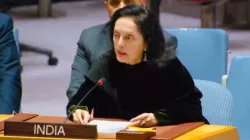'Doublespeak': India slams China for blocking UN proposals to blacklist Pakistan-based terrorists
India said blocking genuine, evidence-based proposals on globally sanctioned terrorists "is uncalled for and smacks of doublespeak". This appears to be a veiled attack on China, a permanent UN member, who has vetoed several proposals by India to blacklist Pakistan-based terrorists.

New York: In a veiled attack on China, India said that blocking evidence-based proposals in the United Nations Security Council to blacklist global terrorists without justification smacks of "double-speak" in dealing with the problem. China has shielded several Pakistan-based terrorists from being backlisted in the UN in the past.
“Let us turn to the subsidiary bodies inhabiting a subterranean world, with their own custom-made working methods and obscure practices which do not find any legal basis in the Charter or any of the Council’s resolutions,” India’s Permanent Representative to the UN Ambassador Ruchira Kamboj said during a session at the UNSC.
Referring to the sanctions committee of the UNSC, Kamboj called for embarking upon the established process in the UN, which is not by engaging in negotiations through text and not through speaking at each other or past each other. "As the threats to international peace and security evolve, so must this council. We ask those blocking progress on this vital issue to heed calls for genuine reform and contribute to making this council truly fit for purpose for the 21st century," she added.
“For instance, while we do get to know of the decisions of these committees on listing, the decisions on rejecting listing requests are not made public. This is indeed a disguised veto, but an even more impervious one that indeed merits a discussion amongst the wider membership,” the Indian envoy to the UN further said.
China shielding Pakistan-based terrorists
Kamboj highlighted that “genuine, evidence-based listing proposals for globally sanctioned terrorists to be blocked, without giving any due justification, is uncalled for and smacks of double-speak" when it came to the UN Security Council’s commitment to tackling the threat of terrorism. This appears to be a veiled attack towards China, which has repeatedly blocked or put technical holds on bids by India and supported by other Council members under the 1267 Al Qaida Sanctions Committee to blacklist Pakistan-based terrorists.
In June last year, China, which holds a permanent seat in the UNSC, blocked a proposal by India and the US to designate Lashkar-e-Taiba terrorist Sajid Mir, wanted for his involvement in the 26/11 Mumbai terrorist attacks, which killed over 160 people in 2008, as a global terrorist under the 1267 Sanctions Committee of the Security Council.
In May 2019, India won a huge diplomatic win at the UN when the global body designated Pakistan-based Jaish-e-Mohammed chief Masood Azhar as a "global terrorist”, a decade after New Delhi had first approached the world body on the issue after long-standing hassles over China's vetoes against the Pakistan-based terrorist.
India's Permanent Representative to the UN Kamboj argued that the selection of chairs of subsidiary bodies and decision-making power must be given through an open process that intends to be transparent. "The selection of chairs of subsidiary bodies and distribution of pen holderships must be made through a process which is open, which is transparent, which is based on exhaustive consultations and with a more integrated perspective. The consensus of the e ten on chairs of subsidiary bodies, to be assumed by the E-10 themselves, must be absolutely honoured by the P-5," she said.
India's call for reforms
India also reiterated its call for UNSC reforms and asked countries that block the revision of giving permanent seats at the forum to contribute to making the council fit for the 21st century. Kamboj further said that as an organ of the UN tasked with the maintenance of international peace and security, the debate on the Council’s working methods remains extremely relevant, especially in the backdrop of Ukraine and Gaza.
“As such, how much has the Security Council been able to deliver on peace and security, with both feet firmly fixed in the past, is a larger question that the member states need to collectively ponder upon,” she said. The UNSC has remained deeply polarised and failed on multiple occasions to take action on resolutions to deal with Ukraine and Gaza conflicts due to vetos cast by its permanent members such as the US and Russia.
“What we therefore need is a Security Council that better reflects contemporary realities – the geographical and developmental diversity of the multipolar world of today, including the voices of the developing countries and unrepresented regions, like Africa, Latin America and the vast majority of Asia and the Pacific. For this, an expansion of the Council in both categories of membership is absolutely essential,” Kamboj further said.
Last week, India presented a detailed model on behalf of G4 countries - Brazil, Germany, Japan and India - for UN Security Council reform that includes new permanent members elected democratically by the General Assembly and displays flexibility on the veto issue. The G4 model by India proposes that the Security Council’s membership increase from the current 15 to 25-26, by adding six permanent and four or five non-permanent members.
(with inputs from agencies)